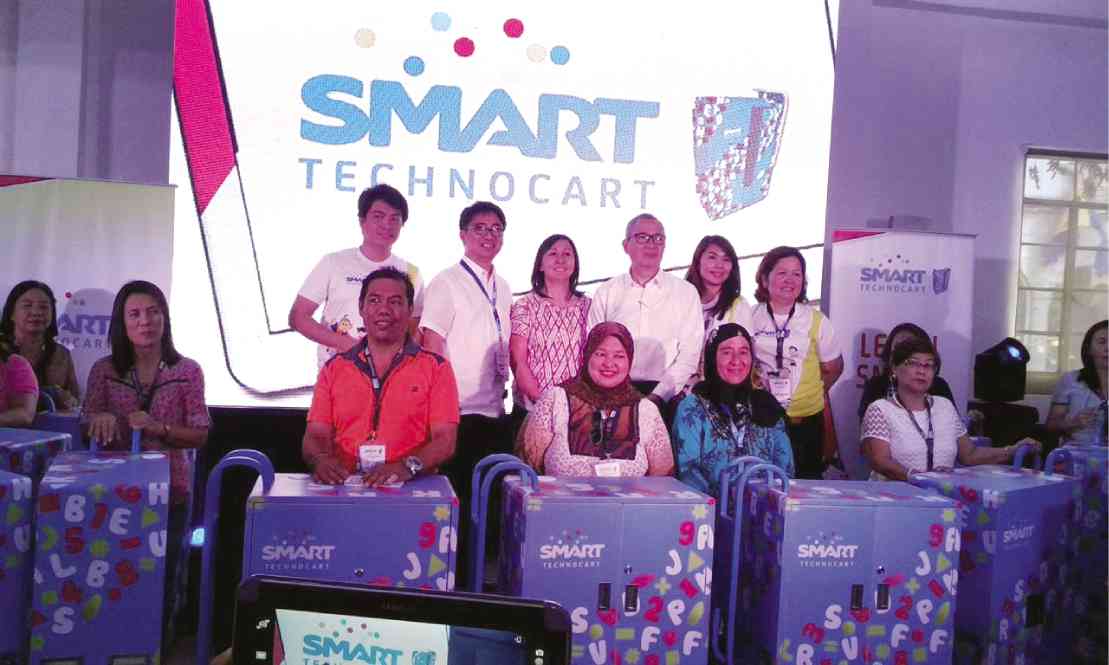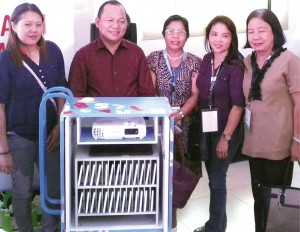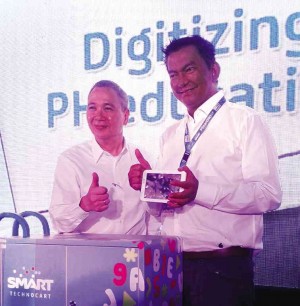The little ‘technocarts’ that could

ISBERTO and Feny de los Angeles-Bautista of “Batibot” (standing, 3rd and 4th from the right) with some of the technocart recipient-teachers
Schools from Pangasinan province in the north to Basilan and Tawi-Tawi provinces in the south were among the first beneficiaries of Smart’s Technocart program, which initially benefits 15 public kindergarten schools across the country.
Representatives of the schools received the technocarts during the program’s launch and inaugural turnover ceremony at Museo Pambata in Manila.
The technocart is a mobile wagon that contains 26 Samsung Galaxy tablets for pupils and teachers, a laptop, a projector and a pocket WiFi for Internet connectivity.
The bundle also includes a learning management system called Smart One Campus that can provide instant feedback for monitoring of students’ academic progress.
An initiative of Smart Communications Inc., the project aims to bridge the gap between learning and technology in the country.
Article continues after this advertisementThe project focuses on developing students as early as the kindergarten level. It is part of the telecommunications company’s continuing efforts to help the country’s educational system, starting from the grassroots, keep up with technological advances.
Article continues after this advertisementSmart is collaborating with the Department of Education (DepEd) for the initiative.
Training courses were conducted for teachers by Community of Learners Foundation to prepare them for the use of the technocart and its devices.
“In a way, it’s dealing with the inevitable. It’s already there, the only question now is how do we maximize the use of these technologies so that they really become productive,” said Ramon Isberto, public affairs group head for Smart.
To encourage engagement and interest among students, the tablets will come preinstalled with the “Batibot” mobile application, which is based on the very popular children’s television show. The app will have educational content aligned with the kindergarten curriculum, particularly numbers and shapes.
Isberto said technocarts were only the beginning of a long-term plan to transform innovation in mobile devices and interactive software into advantageous learning tools.
He said they were going to take a wait-and-see approach, but expressed confidence in the effectiveness of the gadgets.
A press release by Smart said the preliminary testing of technocarts was conducted in 2013 in Culiat Elementary School in Quezon City. Favorable results convinced the telecommunications company that technocarts would be helpful in schools.
“I think this will be a trend for the future in terms of education,” said Albay Gov. Joey Salceda, who attended for two beneficiary schools, Bacacay East Central School and Polangui South Central School, in his province.
“In terms of sustaining the utilization of technology for learning, I think we can support that except the devices are really expensive. That’s why we are very grateful that we were given 50 units of the device,” Salceda said.
Local DepEd divisions worked with Smart in choosing beneficiary schools, prioritizing based on geographical distribution across the nation and capabilities of school officials and teachers to sustain the project, said Education Undersecretary Mario Deriquito of the Office of Partnerships and External Linkages.
The other initial technocart recipients are Batu-Batu Central Elementary School, Datu Halun Laboratory Elementary School and Yusop Dais Elementary School in Tawi-Tawi; Calasiao Central School and Mangatarem Central School in Pangasinan; Maluso Central Elementary School and Tipo-Tipo Central Elementary School in Basilan; Antonio L. Jayme Elementary School, Education and Training Center School II and Rodolfo A. Medel Sr. Elementary School in Bacolod City; Banilad Elementary School and Regino Mercado Elementary School in Cebu; and Parañaque Central Elementary School in Parañaque City, Metro Manila.

